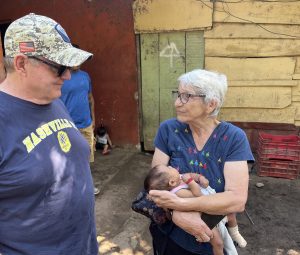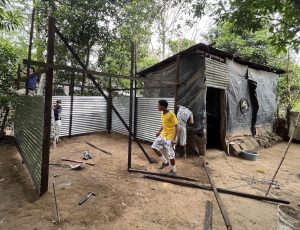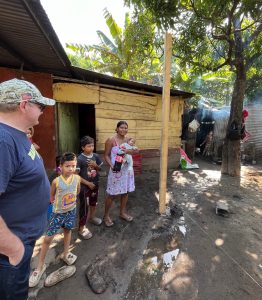Former Chicago developer helping build ‘affordable housing’ in Nicaragua
By Bill Dwyer for Chronicle Media — April 24, 2024
Ed Tunney with Terry Leary in Granada, Nicaragua at a Homes of Hope construction site in January 2024. (Photo by Bill Dwyer/for Chronicle Media)
Chicago native Ed Tunney knows a thing or two about building homes.
Tunney, who is the brother of former 44th Ward Alderman and Ann Sather’s owner Tom Tunney, has developed hundreds of thousands of square feet of housing, first in Chicago and now in Nashville, Tennessee.
Last year Tunney got involved in a much smaller, but to his mind, equally important development project. Instead of upscale residences costing hundreds of thousands of dollars, Tunney is helping build simple houses that change people’s lives for less than $1,000 each.
Tunney, who has kept a vacation home in Nicaragua for more than 35 years, saw a post on the Expats of Granada webpage in 2022 that spotlighted local hotel owner Terry Leary’s Homes for Hope project.

Workers frame out and wall a Homes of Hope house in the Pantanal neighborhood outside Granada in February 2023. (Photo by Bill Dwyer/for Chronicle Media)
Leary, a former Peace Corps volunteer and USAID worker, settled in Granada 20 years ago, renovated what became Hotel Casa San Francisco and began developing real estate. She had built “maybe 20 houses” in the Pantanal neighborhood outside of the city, with the key assistance and supervision of Nicaraguan native Jesse Romero.
Last winter, as she worked to reach a $30,000 fundraising goal to build more housing, it stalled midway. Tunney was intrigued and wanted to help. But while he has a generous heart, you don’t survive in real estate development without practicing due diligence. So, he sent representatives out to see what was happening and report back to him.
Tunney likes to say, “I don’t pick charities, they end up picking me.” And he was impressed with Leary and sold on her project. He said Leary is “someone who’s done so many things successfully. I looked at the program and I saw a leader that was already experienced with a lot of accomplishments. I knew what they were doing was the right thing to do.”

Ed Tunney with a family receiving a new house in January, 2024. (Photo by Bill Dwyer/for Chronicle Media)
Tunney emailed Leary, saying, “Let’s get this done. Here’s $5,000 for a matching grant.” With that major boost, she had her remaining funding in a matter of just days.
“It was an easy give,” Tunney said. “I saw the drive. The drive is what pulled me in.”
He decided he wanted to help spread “awareness (of) something that’s impossible to fix without help.”
When Leary visited Tunney in the states late last spring on a tour of cities to fundraise from numerous benefactors, he gave her another $5,000, and has since sent a third $5,000 contribution.
Many people around the world have no adequate roof over their heads or secure walls around them. It is a day-by-day and night-by-night existence, insecure and unsafe, keeping people at the mercy of both the elements and the world outside their flimsy doors, their persons and meager possessions constantly at risk.
The simple reality of “a roof, a door and a floor,” as Leary put it — solid walls with a strong door and lock, a solid tin roof, and a concrete floor — is life changing.
“The dirt floors carry so many parasites,” Leary said. “And the children sleep on the dirt floors.”
The $750 price tag per house is both incredibly cheap by any western standard, and impossibly expensive for destitute people in Nicaragua and elsewhere in the world. People earning between $1 and $2 a day will never save enough to provide such adequate shelter for themselves.
“You see the relief on their faces,” she said of the parents. “They can sleep with their children, without worrying. It allows the children to go to school and not (have to) watch papa’s shoes and other possessions. It allows people to lock themselves in at night so nobody can enter their house.”
Tunney appreciates the power of wealth to fund deserving projects, but he also appreciates the collective power of smaller dollar donations to help people in need. It’s why he provided the matching funds.
“I figured people would think, ‘If I give $50, I’m really giving $100,” he said. “Just do your little part. All these amounts add up to the $750.”
He added that Homes for Hope has none of the downsides he said he often sees with some other charities, in particular what he calls “charity gouging,” when, he said, “30 percent administrative costs are added on top.”
Tunney said people’s religious and political beliefs aren’t important in helping others, only that they have, “basic integrity, and a moral compass. Your mission is to show children that somebody cares. Your mission is to make things better for people.”
With Tunney’s backing and the “a roof, a floor and a door” as her oft-repeated mantra, Homes for Hope took off. By late March 2023, they had funded and built 63 houses and 12 latrines. By year’s end, Leary said, 210 houses and 65 latrines had been funded and built.
Now she is looking to raise another $100,000 as spring approaches, to build well over 100 more homes and more latrines in 2024. Tunney has become more than a benefactor in the process.
“Ed has become (an unofficial) partner in this,” said Leary. “He’s encouraged me, he’s come up with ideas.” It was Tunney who passed on to her the Bangladeshi concept of a passive air-conditioning system that can lower interior spaces several degrees and provide consistent air flow.
“If I have a problem (with funding) I call him and talk with him.”
Tunney wants to spread the word on how little it costs to have a major impact in people’s lives in places like Nicaragua.
“You change people’s lives for under a grand,” he said.







